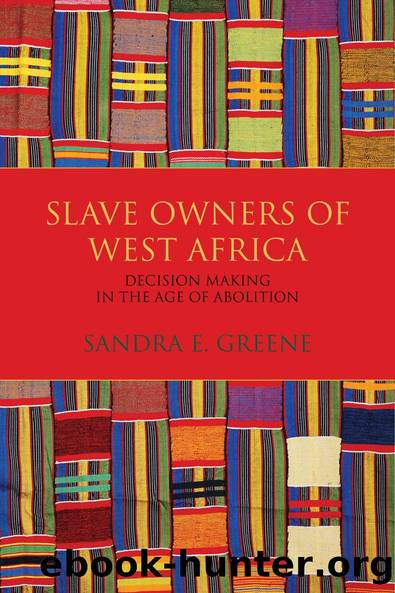Slave Owners of West Africa by Sandra E. Greene

Author:Sandra E. Greene [Greene, Sandra E.]
Language: eng
Format: epub
Tags: History, Africa, West, Social Science, Slavery
ISBN: 9780253026026
Google: WpoqDwAAQBAJ
Publisher: Indiana University Press
Published: 2017-05-22T16:06:40+00:00
4 Concluding Thoughts
SCHOLARS HAVE LONG had an interest in exploring why those in positions of power make the decisions they do. Those who study the history of international affairs have analyzed the various factors that seem to have influenced the decisions of presidents, prime ministers, and dictators to avoid confrontations or to go to war. Legal scholars have examined the social, cultural, educational, and personal backgrounds of a number of U.S. Supreme Court justices to understand how they came to their decisions on important constitutional questions. The writers of biographies have explored as well the factors that appear to have influenced how a specific European or American slave owner managed his or her human property.1 Of particular concern in this study has been the decision making of West African slave owners. How did they handle the abolition and why did they respond in the ways they did? Why did some choose to use violence to maintain the institution of slavery, while others accepted abolition and simply freed their slaves? Why did some incorporate the formerly enslaved into their families as kin, but then refuse to view them as equals, while others insisted that the newly freed be given the same kind of respect accorded the freeborn? What economic, political, and religious motives, what personal experiences and individual proclivities influenced how they handled abolition?
In constructing the biographies of three individuals who lived during the late nineteenth and early twentieth centuries in what is now southeastern Ghana, I have emphasized how different their responses were. Amegashie refused to accept abolition as the new law of the land. He sent armed men to attack former slaves who tried to return home; he relocated his own slaves to an area outside of British colonial jurisdiction. Placed on trial in the colonial courts for slave dealing, he refused to acknowledge either the unethical or illegal practice of slavery. Tamakloe, on the other hand, a man from the same community as Amegashie, followed a very different path. While he never formally freed his slaves, he gave them the kinds of opportunities and a degree of respect that eluded many in Anlo, even those who could claim to be of free descent. He made it possible for his former slaves to obtain Western education at a time when such training had become the key to social and economic mobility. He championed the official titling of the leaders of his three slave villages. Once they were recognized as village leaders, hanuawo, they were able to voice their opinions and participate as equals in the governing body that made decisions on behalf of the entire Anlo polity. Noah Yawo, a citizen of the polity of Ho, was a businessman like Amegashie and Tamakloe. He engaged in farming, but his wealth came largely from trading and moneylending. By 1867 he had the financial resources to buy slaves in the local market and to marry and maintain three wives. Six years later, however, in 1873, he made a commitment to give it all up.
Download
This site does not store any files on its server. We only index and link to content provided by other sites. Please contact the content providers to delete copyright contents if any and email us, we'll remove relevant links or contents immediately.
| Central Africa | East Africa |
| North Africa | Southern Africa |
| West Africa | Algeria |
| Egypt | Ethiopia |
| Kenya | Nigeria |
| South Africa | Sudan |
| Zimbabwe |
Goodbye Paradise(2971)
Men at Arms by Terry Pratchett(2408)
Tobruk by Peter Fitzsimons(2064)
Pirate Alley by Terry McKnight(1910)
Arabs by Eugene Rogan(1837)
Borders by unknow(1789)
Belonging by Unknown(1472)
The Biafra Story by Frederick Forsyth(1325)
It's Our Turn to Eat by Michela Wrong(1305)
Botswana--Culture Smart! by Michael Main(1238)
A Winter in Arabia by Freya Stark(1225)
Gandhi by Ramachandra Guha(1196)
Coffee: From Bean to Barista by Robert W. Thurston(1183)
Livingstone by Tim Jeal(1152)
The Falls by Unknown(1142)
The Source by James A. Michener(1135)
The Shield and The Sword by Ernle Bradford(1101)
Egyptian Mythology A Fascinating Guide to Understanding the Gods, Goddesses, Monsters, and Mortals (Greek Mythology - Norse Mythology - Egyptian Mythology) by Matt Clayton(1088)
Africa: Altered States, Ordinary Miracles by Richard Dowden(1078)
